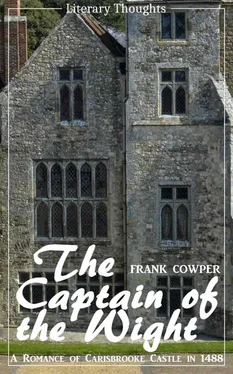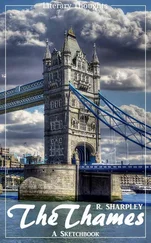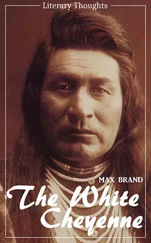The advanced guard had now reached the place where the others were awaiting them.
The Abbot recognised the sergeant-at-arms who led the little band.
"Why, how now, Tom o' Kingston, who'd have thought to have met thee here to-day?"
"What, my Lord Abbot, you over here! 'tis my noble lord will be right pleased to see thee," answered a splendid specimen of a man-at-arms, clad from head to foot in brown armour, his horse barbed and protected with body arms as well. He had his slender lance slung behind him, and his long sword clanked against the iron of his stirrup. His moustaches curled over the lower chin-piece of his salade or helmet, and his eyes looked bold and fierce under the shadow of its projecting peak. Over his breastplate he wore a loose white surcoat, blazoned with the red cross of St George, while a heavy mace hung from his high-peaked saddle-bow. The effect of the massive armour was to give the trooper the appearance of immense width of chest and strength of body, while in reality he was only of medium size, in proportion to men of the present day.
"Is my Lord Woodville nigh at hand, worthy Tom?" said the Abbot.
"Ay, my lord, he is just behind his banner, attended by his own gentlemen, and some gentlemen of France. But I must be getting on, or the march will be delayed. Hast thou any further orders, my Lord Abbot?"
"Nay, Master Tom; I will see thee again at Winchester belike, where I would commend to thy care this young springald here, who comes of gentle birth, and is desirous of learning knightly feats of arms under thy noble master."
"He shall be right welcome, whoever he is, but all the more so that he cometh under thy commendation, reverend lord. 'Tis a right gallant youth, and he sitteth his horse full manfully."
So saying, the sergeant-at-arms clapped spurs to his horse, made a salute with his gauntleted hand, and trotted after his party, who had gone on while he was exchanging greetings with the Abbot.
"Note him well, Ralph; he is one of the best soldiers we have in our island, and he comes of gentle blood too. He is the most trusty of all the men-at-arms belonging to my Lord Woodville."
The main body of the troops had now come close to where they were standing. The foremost ranks passed them without any greeting beyond a respectful salute to the Abbot. The men marched along in very loose order, for it was a time of peace, and they were returning from the successful but deadly fight at Stoke. Several of them were bandaged on the arm or head, and those who were wounded were only lightly armed.
After this body had passed, a little interval elapsed, and then came Sir Edward Woodville, commonly called Lord Woodville, Lord and Captain of the Isle of Wight, and knight of the Lancastrian order of S.S.[*] He was attended by several gentlemen, mostly English, but some two or three evidently French. He was preceded by two men-at-arms, and three mounted archers, all splendidly armed and equipped. Behind him came a group of three or four pages, all young men of good birth, aspirants to knightly rank, and being trained in the household of Sir Edward Woodville.
[*] The origin of this symbol is not known. Conjecture has varied between the words "Soveraygno Seneschal" and the swan badge of the House of Lancaster. The collar formed a very graceful ornament, the gold S.S. being linked together, or set on blue and white ribbon.
Ralph looked at these eagerly. They would be his future companions, and he felt a little shy at first, as the boys all scanned him critically, making remarks to each other the while in a low tone.
Lord Woodville instantly recognised the Abbot, and greeted him cordially. After the mutual salutations were over, and the Abbot of Quarr had congratulated him on the success of the King's arms, and his own part in the fray, he introduced Ralph to him, as a present from himself, telling Lord Woodville his previous history and lineage.
At the mention of the word Lisle, a shade seemed to pass over the tranquil face of the Captain of the Wight, like a cloud shadow over the smooth slope of a southerly down; but it passed as quickly as it came, and although he examined the boy more attentively, his expression had resumed its usual serenity.
The boy felt somewhat abashed as the calm grey eyes of the distinguished knight and nobleman fell upon him, searching him through and through; but he scanned the countenance and appearance of his future lord with shy interest, in spite of the awe his glance produced.
He saw before him a gentleman of about thirty to thirty-five years of age, in the prime of life, and strikingly handsome. For all the Woodvilles, both male and female, were remarkable for their personal advantages, and inherited the beauty of person which had caused Jacquetta of Luxemburg, second wife of the great Duke of Bedford, and the cause of the ruin of the English power in France nearly as much as the hapless Joan of Arc, to choose their father, a simple country gentleman, for her second husband. He was dressed magnificently, and very elegantly. Covering his long dark chestnut hair, which hung down on each side of his face, was a velvet bonnet, ornamented with an ostrich plume on one side, fastened by a brilliant ruby brooch. Dark eyebrows surmounted very expressive grey eyes; his complexion would have been fair, had it not been bronzed by long exposure in many a campaign and knightly enterprise. His face was clean shaven, and thus the firm but sweet lines of his mouth were displayed to full advantage. A close-fitting lace collar round his neck contrasted with the spiral ridge of his steel gorget, which the richly-embroidered surcoat, cut straight across the chest, from shoulder to shoulder, allowed to be plainly visible. The short sleeves of this surcoat reached only to the elbows; the rest of his person was encased in rich armour, while a gorgeous gold-studded belt supported his straight long sword and richly-jewelled dagger. His helmet was carried by an esquire fully armed, who also bore his lord's lance. A handsome collar of S.S., ending in a portcullis badge, adorned his neck, while instead of steel gauntlets he wore soft leather gloves, and a splendid falcon rested on his right hand. Another esquire bore his lord's shield, and led a spare horse, fully accoutred in body armour and housing for battle or tilt.
"So this is Master Ralph de Lisle, is it?" said Lord Woodville, who had been appointed on the accession of Henry VII. to succeed his unfortunate but accomplished brother, Lord Scales, in the lordship of the Isle of Wight. "He cometh of an old Isle of Wight family, and is heartily welcome to such training as he can acquire in my poor household. Truly an his deeds shall answer to his fair outside, he will prove a right hardy knight. But tell me," he added, "is he of near kin to old Sir William Lisle of Briddlesford?"
"Nay, my lord, not of close kin," replied the Abbot of Quarr. "Sir William's grandsire returned to the land of his fathers in Harry the Fourth's reign. As thou knowest, he hath but one son and one daughter, and he hath disinherited the son. 'Tis a sad story."
"Ah! I had forgotten," said Lord Woodville. Then turning to the old knight who rode a little behind, he said, "Here, Sir John Trenchard, is one more to add to your charge. I deliver Master Lisle to your care, knowing full well I cannot give him to a better master of chivalry and gentle learning. Teach him as you so well know how, and the King will gain a fine soldier, and you, my friend, more credit than ever."
Lord Woodville then smiled graciously at Ralph and turned to the Abbot to continue the converse interrupted by the presentation of the boy.
So Ralph Lisle was introduced to his future Lord, and from henceforth would be under the orders of the good knight Sir John Trenchard, until he should be declared worthy to rank as an esquire, and take part in warlike expeditions.
Читать дальше












